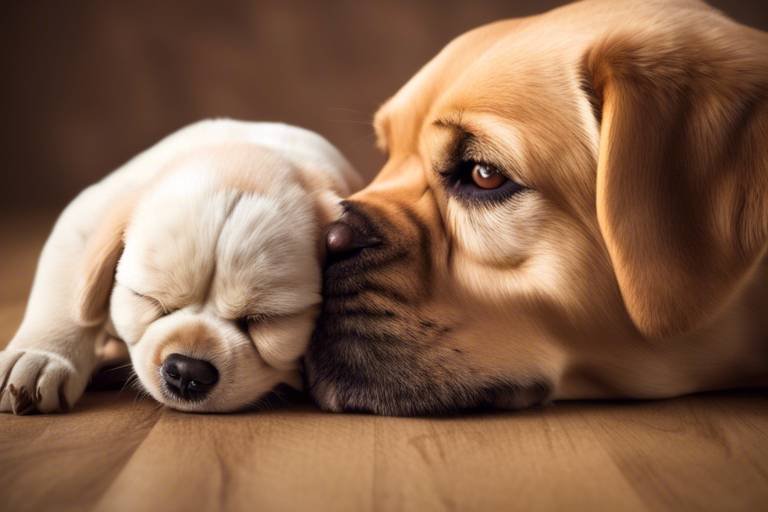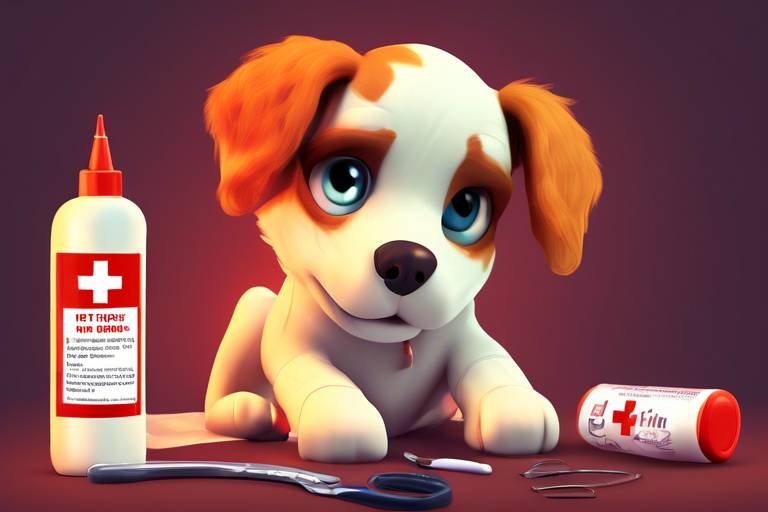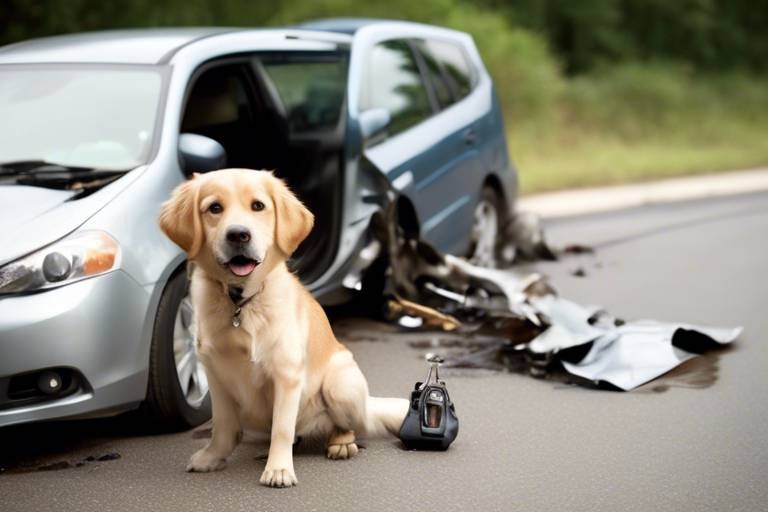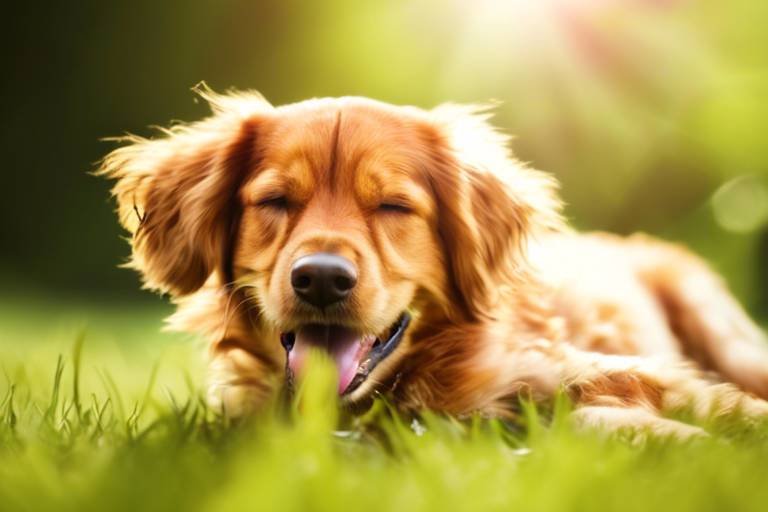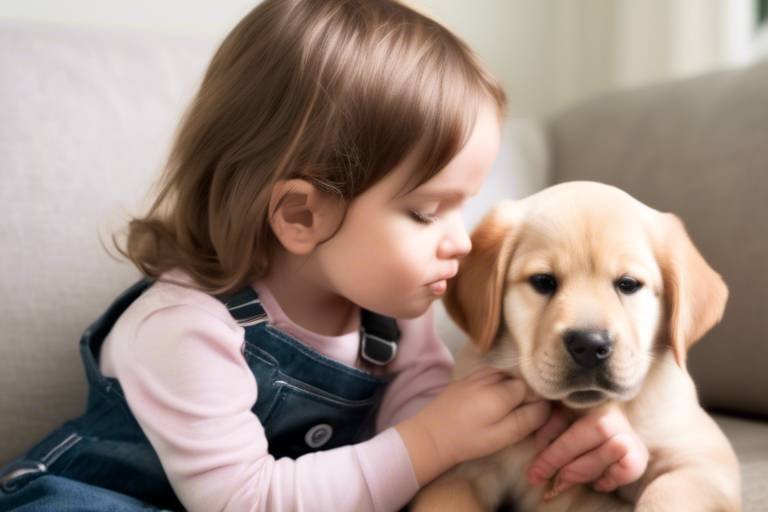How to Identify Signs of a Concussion in Pets
As pet owners, we often view our furry friends as family members. Just like humans, pets can suffer from injuries that may lead to serious health issues, such as concussions. Understanding how to identify the signs of a concussion in your pet is crucial to ensuring their well-being. What might seem like a simple bump on the head could actually be a sign of something more serious. So, how can you tell if your pet has sustained a concussion? In this article, we will explore the essential indicators of concussions in pets, providing you with the knowledge you need to recognize symptoms and seek timely veterinary care.
Concussions in pets can occur due to various types of trauma, such as falls, vehicle accidents, or even rough play with other animals. A concussion happens when there is a sudden impact that causes the brain to move rapidly within the skull. This movement can lead to temporary disruption in brain function, which may affect your pet's behavior, physical abilities, and overall health. Understanding the nature of these injuries is vital for pet owners, as it allows them to act quickly and effectively if their pet shows signs of distress.
Recognizing the common symptoms of concussions in pets is essential for early intervention. Just like humans, pets may exhibit a range of signs that can indicate a concussion. Some of these symptoms may be subtle, while others can be quite pronounced. It's important to be vigilant and observant, especially if your pet has experienced any kind of trauma. Here are some key signs to look for:
After a concussion, pets may exhibit unusual behavior that can be alarming to owners. You might notice your pet becoming more irritable or, conversely, more lethargic than usual. They may also seem disinterested in activities they typically enjoy, such as playing fetch or going for walks. If your pet is acting strangely, it’s crucial to pay attention to these changes, as they can be indicative of a concussion.
Disorientation and confusion are critical signs of a concussion. After an injury, pets may seem lost or uncoordinated, struggling to navigate familiar environments. You might observe them walking in circles, bumping into furniture, or appearing dazed. This confusion can be distressing for both the pet and the owner, highlighting the importance of recognizing these symptoms early on.
A sudden change in appetite can signal a concussion. If your pet refuses food or water, it could indicate underlying health issues related to their injury. Pets may also exhibit signs of nausea, which can accompany a concussion. Monitoring your pet's eating habits is essential; a lack of interest in food can be a red flag that something is wrong.
Physical symptoms are also significant in identifying concussions. Observable signs such as vomiting, seizures, or difficulty walking require immediate veterinary attention. If your pet is experiencing any of these symptoms, it’s crucial to seek help right away. Remember, the sooner you act, the better the chances of a successful recovery for your beloved companion.
Knowing when to seek veterinary care is crucial for a pet with a suspected concussion. If you notice any of the symptoms mentioned above, do not hesitate to consult a veterinarian. Certain scenarios necessitate immediate veterinary intervention, such as:
Some emergency signs can indicate a severe concussion. These include:
- Loss of consciousness
- Persistent vomiting
- Severe lethargy
- Seizures
- Uncontrolled bleeding
If your pet exhibits any of these symptoms, it is essential to seek urgent medical attention. Prompt care can make a significant difference in the outcome of your pet's recovery.
Post-concussion care is vital for recovery. After a veterinary visit, your pet may require follow-up examinations to monitor their healing process. During this time, it’s important to provide a calm and safe environment for your pet. Limit their physical activity and offer plenty of rest. You can support your pet during the healing process by:
- Following your vet's instructions carefully
- Monitoring their behavior and symptoms closely
- Providing a quiet space for recovery
Remember, recovery can take time, and your patience will be key in helping your furry friend heal.
Q: How long does it take for a pet to recover from a concussion?
A: Recovery time can vary depending on the severity of the concussion. Some pets may recover within a few days, while others may take weeks. Always follow your veterinarian's advice for the best outcome.
Q: Can I treat my pet's concussion at home?
A: While you can provide supportive care at home, it is crucial to consult with a veterinarian for a proper diagnosis and treatment plan.
Q: What should I do if my pet loses consciousness?
A: If your pet loses consciousness, seek emergency veterinary care immediately. This is a serious sign that requires prompt attention.
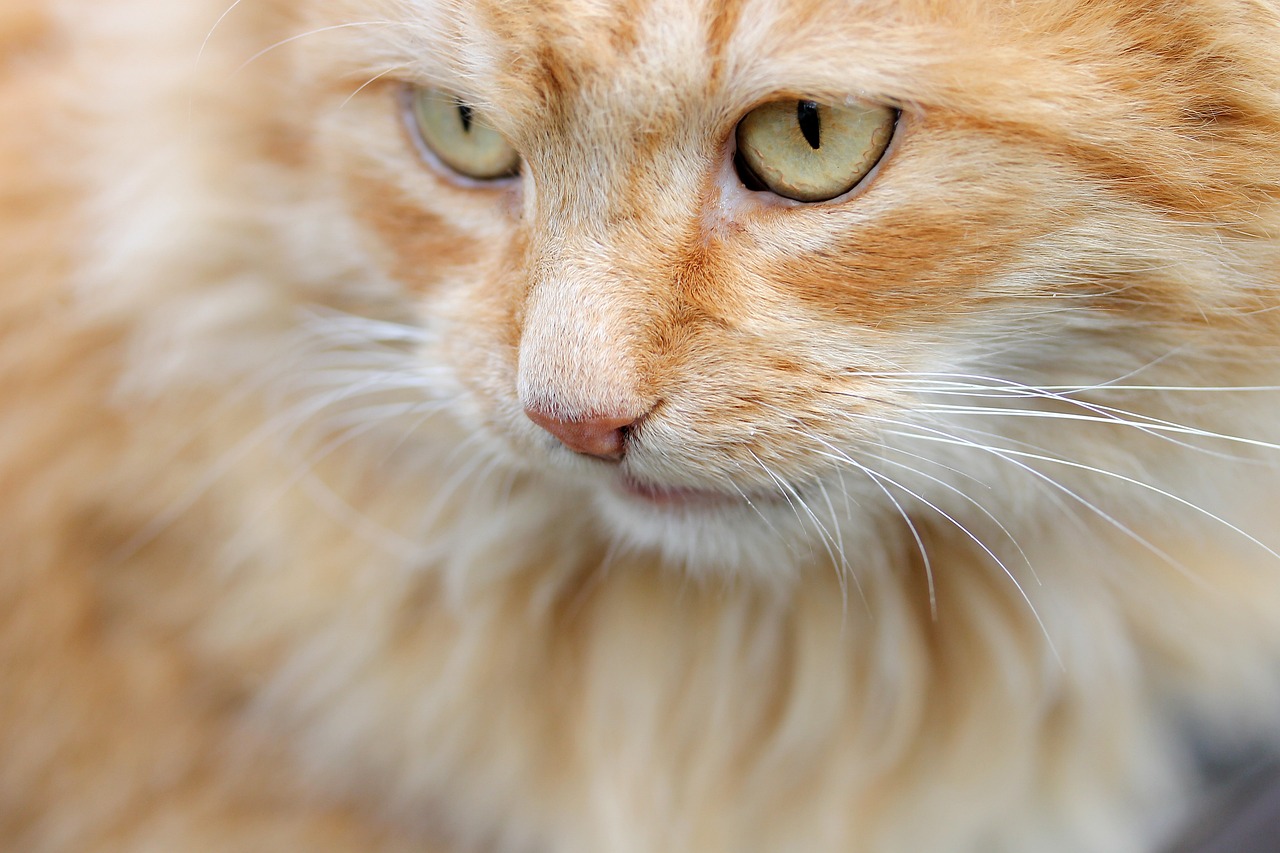
Understanding Concussions in Pets
This article explores the crucial indicators of concussions in pets, providing pet owners with essential knowledge to recognize symptoms and seek timely veterinary care for their furry companions.
Concussions in pets are often the result of a traumatic event, such as a fall, a collision, or an accident. Just like in humans, a concussion occurs when a pet’s brain is jolted or shaken inside the skull, leading to a temporary disruption of normal brain function. Understanding what a concussion entails is vital for any pet owner, as it can significantly affect your furry friend’s health and well-being.
The impact of a concussion can vary widely, depending on the severity of the trauma and the individual pet's health. Some pets may bounce back quickly, while others may experience lasting effects that can alter their behavior and quality of life. This injury can be likened to a car accident; sometimes, the damage isn’t visible on the surface, but underneath, there could be serious issues brewing. Therefore, recognizing the signs and symptoms of a concussion is crucial to ensuring that your pet receives the appropriate care.
It’s essential to remember that not all concussions are the same, and pets may not exhibit the classic signs that we might expect. For instance, a pet might not show immediate symptoms after a bump to the head, but that doesn’t mean they are in the clear. The symptoms can manifest hours or even days later, making it imperative for pet owners to stay vigilant. Here are some key points to consider:
- Trauma Source: Concussions can arise from various sources, including falls, rough play, and even car accidents.
- Age and Breed: Certain breeds and older pets may be more susceptible to concussions.
- Severity of Impact: The greater the force of the impact, the higher the chance of a concussion.
In summary, understanding concussions in pets is not just about knowing that they can happen; it's about recognizing the potential consequences and being proactive in seeking help when needed. If you suspect your pet has suffered a concussion, don’t hesitate to consult your veterinarian. Quick action can make all the difference in your pet's recovery.
Recognizing the common symptoms of concussions in pets is essential for early intervention. This section outlines key signs to look for, ensuring that pet owners can act quickly when their pets show distress.
Pets may exhibit unusual behavior following a concussion. This subsection discusses specific behavioral changes, such as increased irritability or lethargy, that can indicate a concussion in your pet.
Disorientation and confusion are critical signs of a concussion. Here, we examine how pets may seem lost or uncoordinated, affecting their ability to navigate familiar environments.
A sudden change in appetite can signal a concussion. This section highlights how pets may refuse food or water, a potential indicator of underlying health issues.
Physical symptoms are also significant in identifying concussions. This subsection focuses on observable signs such as vomiting, seizures, or difficulty walking, which require immediate veterinary attention.
Knowing when to seek veterinary care is crucial for a pet with a suspected concussion. This section outlines scenarios that necessitate immediate veterinary intervention to ensure your pet's safety.
Certain emergency signs can indicate a severe concussion. This subsection details symptoms such as loss of consciousness or persistent vomiting that warrant urgent medical attention.
Post-concussion care is vital for recovery. This section discusses the importance of follow-up veterinary visits and how to support your pet during the healing process.
As pet owners, we often have numerous questions when it comes to our furry friends' health. Here are some common inquiries regarding concussions in pets:
- What should I do if I suspect my pet has a concussion? It's critical to consult your veterinarian as soon as possible for an accurate diagnosis and appropriate treatment.
- Can pets fully recover from a concussion? Yes, many pets can recover fully with proper care and monitoring, although some may experience lingering effects.
- How can I prevent concussions in my pet? Supervise playtime, avoid rough housing, and ensure your pet is safe when engaging in activities that could lead to injury.

Common Symptoms of Concussions
Recognizing the common symptoms of concussions in pets is essential for early intervention. Just like humans, our furry friends can experience traumatic brain injuries, and being aware of the signs can make all the difference in their recovery. When a pet suffers from a concussion, their body may react in various ways, and as a caring pet owner, it’s crucial to be vigilant. If you notice any unusual behaviors or physical symptoms, don’t hesitate to seek veterinary care.
One of the most telling signs of a concussion is behavioral changes. Pets may become unusually irritable or lethargic. You might find your playful pup suddenly uninterested in their favorite toys or your affectionate kitty avoiding cuddles. These changes can range from subtle to drastic, making it essential to pay close attention to your pet's demeanor. For instance, if your dog, who usually greets you with a wagging tail, seems withdrawn or disoriented, it could be a red flag.
In addition to irritability and lethargy, pets may exhibit other behavioral changes that signal a concussion. They might seem more anxious than usual or even display aggressive behavior. Imagine your normally calm cat hissing at you for no reason—this could indicate that something is off. Furthermore, pets may also show signs of disorientation and confusion. They may appear lost or uncoordinated, struggling to navigate their familiar surroundings. This confusion can manifest in various ways, such as bumping into furniture or failing to recognize their owners.
Disorientation and confusion are critical signs of a concussion. Pets may exhibit symptoms such as wandering aimlessly or appearing dazed. For example, if your dog seems to forget basic commands or stares blankly at you, it’s time to take note. This state of confusion can be alarming, and it’s essential to ensure your pet is safe from potential hazards while they are in this condition.
Another important symptom to watch for is a sudden change in appetite. If your pet refuses food or water, it could be a sign of an underlying health issue, including a concussion. Pets that are typically food-driven may suddenly lose interest in their meals, which is not only concerning but can also lead to further health complications. Keeping track of your pet’s eating habits can provide valuable insights into their well-being. If you notice a decline in their appetite, it’s crucial to consult with your veterinarian.
Physical symptoms are also significant in identifying concussions. Observable signs such as vomiting, seizures, or difficulty walking require immediate veterinary attention. If your pet starts to vomit repeatedly or has a seizure, these are emergency situations that cannot be ignored. Additionally, if they seem unsteady on their feet or struggle to maintain balance, it’s a clear indication that something is wrong. Remember, your pet relies on you to notice these signs, so being attentive can be lifesaving.
In summary, being aware of the common symptoms of concussions in pets is crucial for their health and safety. From behavioral changes to physical symptoms, recognizing these signs early can lead to prompt veterinary care, ensuring your furry friend gets the help they need. Always trust your instincts as a pet owner; if something feels off, it’s better to be safe than sorry. Your pet’s health is worth every effort!
- What should I do if I suspect my pet has a concussion? If you suspect your pet has a concussion, contact your veterinarian immediately. They can provide guidance and determine the best course of action.
- How long does it take for a pet to recover from a concussion? Recovery time can vary based on the severity of the concussion and the pet's overall health. Always follow your veterinarian's recommendations for recovery.
- Can I treat my pet's concussion at home? While you can provide comfort and a quiet space, it’s essential to seek professional veterinary care for proper diagnosis and treatment.
Behavioral Changes
When it comes to our beloved pets, noticing even the slightest can be a crucial indicator of their health. After experiencing a concussion, pets may display a range of unusual behaviors that can leave pet owners feeling puzzled and concerned. Imagine your pet, usually full of life and energy, suddenly becoming a shadow of its former self. This transformation can be alarming, and recognizing these shifts is essential for timely intervention.
One of the most common changes you might observe is increased irritability. Pets that once enjoyed cuddling or playing may become withdrawn or even snap when approached. This shift in temperament can be a clear sign that something is amiss. Additionally, you might notice your furry friend becoming more lethargic than usual, spending hours lying down instead of engaging in their favorite activities. It’s as if they’ve lost their spark, and this lethargy can be a red flag for pet owners.
Another behavior to watch for is disinterest in previously loved activities. For instance, if your dog has always been eager to fetch a ball or if your cat enjoys chasing after toys, a sudden lack of enthusiasm for these activities can indicate that they are not feeling well. This disinterest can extend to social interactions too; pets may shy away from family members or other pets they usually adore. It’s almost like they’ve entered a different world, one where they feel disconnected from their surroundings.
Moreover, pets may exhibit signs of anxiety or nervousness following a concussion. You might notice them pacing, whining, or even hiding in corners. These behaviors can be distressing for both the pet and the owner, as it’s clear that the pet is struggling with something beyond just physical discomfort. In such cases, it’s essential to approach your pet with patience and understanding, providing them with a safe space to recover.
In summary, being vigilant about these behavioral changes can make a significant difference in your pet's recovery journey. If you observe any of these signs, it’s crucial to consult with a veterinarian promptly. After all, your pet relies on you to be their advocate, and recognizing these changes can help ensure they receive the care they need.
- What should I do if I suspect my pet has a concussion?
Immediately seek veterinary care for a thorough examination and diagnosis. - How long does it take for a pet to recover from a concussion?
Recovery times can vary based on the severity of the concussion and the individual pet, but follow-up care is crucial. - Can behavioral changes indicate other health issues?
Yes, behavioral changes can be a sign of various health problems, so it’s important to monitor your pet closely.
Disorientation and Confusion
When a pet suffers a concussion, one of the most alarming signs to watch for is . Imagine your furry friend, usually so vibrant and full of life, suddenly seeming lost in their own home. It can be quite distressing for both the pet and the owner. This state of confusion can manifest in various ways, making it essential for pet owners to recognize these signs quickly.
Pets may appear to be wandering aimlessly, bumping into furniture, or struggling to navigate familiar spaces. It’s as if they’ve stepped into a maze that was once their cozy living room. You might notice them staring blankly at walls or getting stuck in corners, unable to find their way out. This behavior is not just quirky; it’s a serious indication that something is wrong. Disorientation can also lead to increased anxiety, making your pet seem restless or agitated.
In addition to physical signs, you may observe changes in your pet's response to commands or familiar cues. For instance, if your dog typically comes running when called, a concussed pet might ignore you altogether or respond sluggishly. This disconnect can be heart-wrenching, as it highlights their altered state of awareness. You might also notice unusual vocalizations, such as whining or barking, which could indicate their confusion or distress.
To help you better understand the signs of disorientation and confusion in pets, consider the following key indicators:
- Wandering aimlessly or getting stuck in corners
- Staring blankly at walls or objects
- Difficulty responding to commands or familiar sounds
- Unusual vocalizations, such as whining or barking
- Increased anxiety or restlessness
If you observe any of these behaviors in your pet after an incident that could have caused a concussion, it’s crucial to seek veterinary care as soon as possible. Remember, the sooner you act, the better the chances of a full recovery for your beloved companion.
Q: What should I do if I suspect my pet has a concussion?
A: If you suspect your pet has a concussion, it's essential to seek veterinary care immediately. A professional can assess the severity of the injury and recommend appropriate treatment.
Q: How long does it take for a pet to recover from a concussion?
A: Recovery time can vary depending on the severity of the concussion. Mild cases may resolve in a few days, while more severe injuries could take weeks or even months for full recovery.
Q: Are there any long-term effects of concussions in pets?
A: Yes, some pets may experience long-term effects, such as behavioral changes or cognitive difficulties. Regular follow-up visits with your veterinarian can help monitor your pet's recovery.
Changes in Appetite
One of the more subtle yet significant signs of a concussion in pets is a sudden change in appetite. Just like humans, our furry friends can experience a range of emotional and physical responses to trauma, and their eating habits are often a reflection of their overall well-being. If your pet suddenly refuses to eat or drink, it could be a red flag that something is seriously wrong. Imagine a dog that usually gobbles up its food in seconds suddenly turning its nose up at dinner time. It’s not just being picky; it could be a sign that they’re in distress, either physically or mentally.
When a pet experiences a concussion, their body goes through various changes. The stress and pain associated with the injury can lead to a decreased desire to eat. This is particularly concerning because proper nutrition is crucial for recovery. Pets may also become nauseous, which can further contribute to their reluctance to eat. If you notice your pet exhibiting these behaviors, it’s essential to monitor them closely and consider their overall condition.
Here are a few signs related to changes in appetite to watch for:
- Refusal to eat: If your pet, who usually has a hearty appetite, suddenly stops eating their favorite treats, it’s time to take notice.
- Increased thirst or refusal to drink: Changes in water intake can also indicate underlying issues. If your pet seems to avoid drinking, it could lead to dehydration.
- Pacing or restlessness: If your pet is acting restless or is pacing around the house, it could be a sign that they are uncomfortable and not feeling well enough to eat.
It’s essential to remember that these changes can happen quickly and may not always be obvious. If your pet shows any combination of these symptoms, it’s crucial to consult with your veterinarian as soon as possible. They can provide a thorough examination and determine the best course of action. After all, just like us, pets need the right fuel to heal and bounce back to their playful selves!
Q: How quickly should I seek veterinary care if my pet shows changes in appetite?
A: If your pet refuses to eat for more than 24 hours, or if you notice any additional concerning symptoms, it’s best to consult your veterinarian immediately.
Q: Can stress alone cause changes in my pet's appetite?
A: Yes, stress can significantly affect a pet’s appetite. However, if the change is sudden and accompanied by other symptoms, it’s essential to investigate further.
Q: What should I do if my pet refuses to eat after a concussion?
A: Contact your veterinarian for advice. They may recommend a special diet or further testing to ensure there are no underlying issues.
Physical Symptoms
When it comes to identifying a concussion in your furry friend, can be some of the most telling signs. Just like humans, pets can exhibit a range of physical reactions following a traumatic event. These symptoms are crucial indicators that something might be seriously wrong, and they should never be ignored. If you notice your pet displaying any of the following signs, it's essential to act quickly and consult with a veterinarian.
One of the most common physical symptoms of a concussion is vomiting. If your pet starts to vomit repeatedly, it could indicate increased intracranial pressure or other serious issues stemming from a head injury. Additionally, keep an eye out for seizures, which can occur in pets following a concussion and may range from mild twitching to full-blown convulsions. If your pet experiences a seizure, it's critical to seek veterinary attention immediately.
Another physical sign to watch for is difficulties with coordination. You might notice that your pet is stumbling or having trouble walking, which can be alarming. This lack of coordination can stem from brain swelling or damage, making it hard for your pet to navigate their usual environment. If your pet seems to be unsteady on their feet, it’s a clear signal that something isn’t right.
In addition to these symptoms, you might observe changes in your pet's gait. They may walk differently, dragging their paws or appearing to be in pain while moving. This change can be particularly distressing, as it not only affects their mobility but can also impact their overall quality of life. If your pet is exhibiting any of these physical symptoms, it’s crucial to keep a close eye on them and document any changes to share with your vet.
Here’s a quick summary of the key physical symptoms to be aware of:
- Vomiting
- Seizures
- Difficulties with coordination
- Changes in gait
Remember, early detection is key to effective treatment. If your pet shows any of these signs after a head injury, don’t hesitate to reach out to your veterinarian. They can conduct the necessary examinations to determine the severity of the concussion and recommend the best course of action for your beloved companion.
Q: How can I tell if my pet has a concussion?
A: Look for signs such as vomiting, seizures, changes in coordination, or unusual behavior. If you notice any of these symptoms after a head injury, consult your veterinarian immediately.
Q: What should I do if I suspect my pet has a concussion?
A: Seek veterinary care as soon as possible. The vet will perform a thorough examination and may recommend diagnostic tests to assess your pet's condition.
Q: Can pets fully recover from a concussion?
A: Yes, many pets can recover fully from a concussion with proper care and treatment. Follow your vet's recommendations for recovery and monitor your pet closely during the healing process.
Q: Are there any long-term effects of concussions in pets?
A: Some pets may experience long-term effects, such as behavioral changes or neurological issues. Regular follow-up visits with your vet can help manage these potential complications.
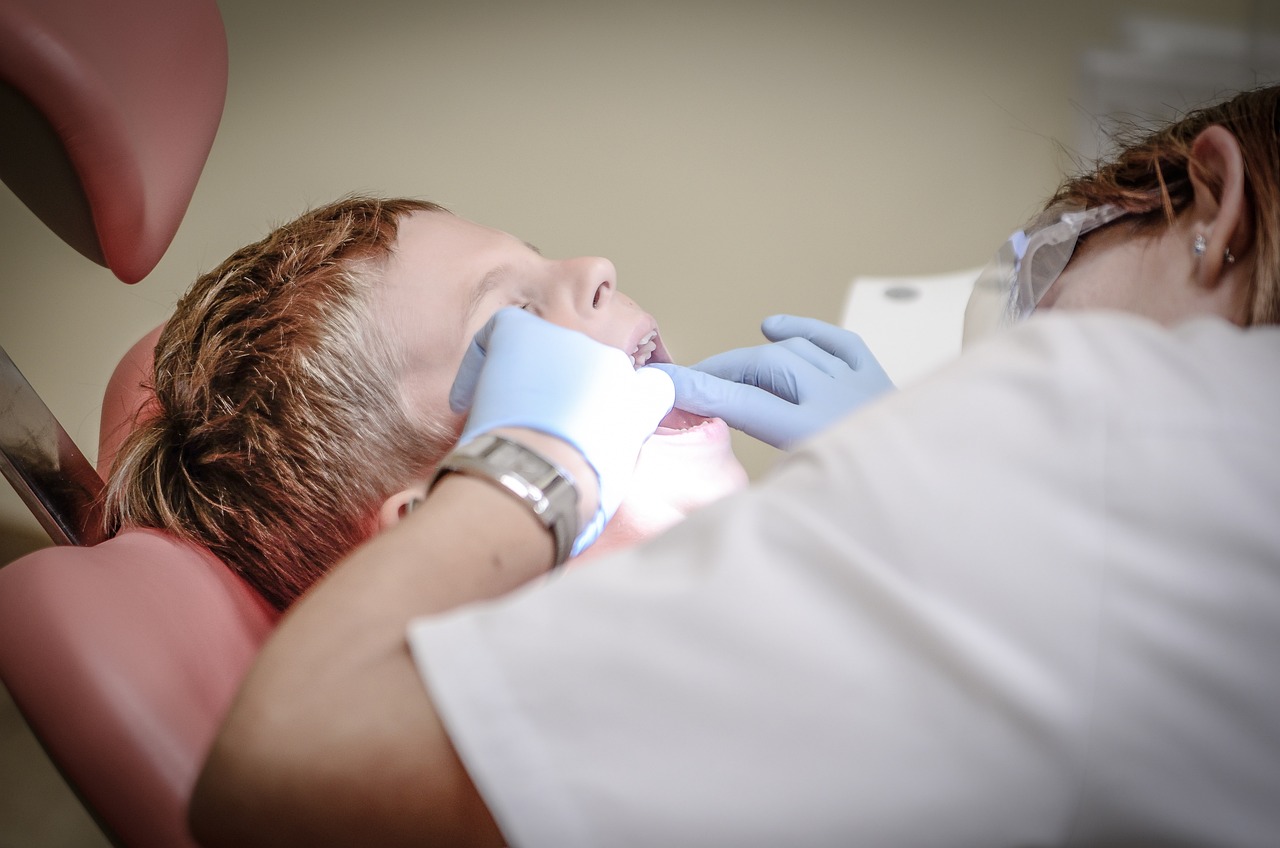
When to Seek Veterinary Care
Knowing when to seek veterinary care for your pet after a suspected concussion is crucial for their health and well-being. Just like humans, pets can suffer from serious complications if a concussion goes untreated. So, how do you know when it’s time to rush to the vet? It’s all about being vigilant and understanding the signs that indicate your furry friend needs immediate attention. If you ever find yourself in doubt, it’s always better to err on the side of caution. Remember, your pet relies on you to be their advocate!
There are certain scenarios that should trigger an immediate visit to the veterinary clinic. For instance, if your pet experiences any of the following symptoms, it’s essential to act fast:
- Loss of consciousness: If your pet appears to be unresponsive or has fainted, this is a serious condition that requires urgent care.
- Persistent vomiting: While occasional vomiting can happen for various reasons, consistent vomiting after a head injury is alarming and could indicate a more severe issue.
- Seizures: Witnessing your pet having a seizure can be terrifying. If this occurs post-injury, it’s crucial to get them to a vet immediately.
- Severe lethargy: If your pet is unusually tired and unresponsive to stimuli, this could be a sign of a significant problem.
- Difficulty walking or coordination issues: If your pet seems unsteady or is having trouble standing, this could indicate neurological issues that require prompt attention.
In addition to these emergency signs, keep an eye out for any unusual behavior. Pets are creatures of habit, and any deviation from their normal routine can be a red flag. For example, if your dog, who typically greets you with enthusiasm, suddenly becomes withdrawn or aggressive, it’s time to consult your veterinarian. These behavioral changes can be just as telling as physical symptoms.
After your initial vet visit, follow-up care is equally important. Your veterinarian may recommend additional tests or monitoring to ensure your pet is recovering properly. This might include:
| Follow-Up Care | Purpose |
|---|---|
| Regular Check-Ups | To monitor recovery progress and make necessary adjustments to treatment. |
| Neurological Assessments | To evaluate brain function and ensure no lasting damage has occurred. |
| Rest and Recovery Plans | To provide guidelines on how to help your pet heal, including activity restrictions. |
As a loving pet owner, your role in your pet's recovery cannot be overstated. You are their first line of defense when it comes to health issues. If you notice anything unusual, don’t hesitate to reach out to your vet. They are there to help you navigate these challenging situations and ensure your pet gets the care they need.
Q: What should I do if my pet has a concussion?
A: If you suspect your pet has a concussion, keep them calm and quiet. Avoid any physical activity and consult your veterinarian as soon as possible.
Q: How long does it take for a pet to recover from a concussion?
A: Recovery time can vary based on the severity of the concussion and your pet's overall health. Follow your vet's guidance for the best recovery plan.
Q: Are there any long-term effects of concussions in pets?
A: Some pets may experience lingering effects, while others may recover completely. Regular follow-ups with your vet can help monitor any long-term issues.
Emergency Signs to Watch For
When it comes to our beloved pets, being vigilant is key, especially after a potential head injury. Emergency signs can signify a serious concussion that needs immediate attention. If your pet shows any of the following symptoms, it’s crucial to act swiftly and get them to a veterinarian.
One of the most alarming signs is loss of consciousness. If your furry friend seems unresponsive or is having difficulty waking up, this could indicate a severe concussion. Similarly, persistent vomiting is another red flag. It’s not just a minor upset stomach; repeated vomiting can lead to dehydration and other complications, making it essential to seek veterinary care right away.
Additionally, be on the lookout for seizures. If your pet experiences convulsions or unusual twitching, this is a critical situation that requires immediate medical intervention. Another concerning sign is difficulty walking. If your pet is stumbling, dragging their feet, or unable to stand, they may be suffering from significant neurological impairment.
Other symptoms to monitor include:
- Severe lethargy – If your pet is unusually tired and unresponsive to stimuli.
- Unusual vocalizations – Whining, yelping, or growling when they usually wouldn’t.
- Eye abnormalities – Look for dilated pupils or unusual eye movements.
Recognizing these emergency signs can be the difference between a quick recovery and a more serious situation for your pet. Always trust your instincts as a pet owner; if something feels off, don’t hesitate to consult with a veterinarian. Your pet’s health and well-being are worth every moment of concern.
Q: What should I do if I suspect my pet has a concussion?
A: If you suspect your pet has a concussion, observe them closely for any emergency signs mentioned above. If they exhibit any concerning symptoms, seek veterinary care immediately.
Q: Can concussions in pets heal on their own?
A: While some mild concussions may resolve with proper rest and care, it’s crucial to have your pet evaluated by a veterinarian to rule out more severe injuries.
Q: How can I support my pet during recovery?
A: Provide a quiet, comfortable space for your pet to rest, limit their activity, and follow your veterinarian’s advice regarding follow-up care and medication.
Follow-Up Care and Recovery
After your pet has experienced a concussion, follow-up care is essential for ensuring a smooth recovery. Just like humans, pets need time to heal, and their needs may change during this period. It's crucial to maintain close communication with your veterinarian to monitor your pet's progress and make any necessary adjustments to their care plan. Remember, recovery is not just about physical healing; emotional support plays a significant role too. Your furry friend may feel anxious or confused after the injury, so providing a calm and loving environment can make a world of difference.
During the recovery phase, it's important to observe your pet for any lingering symptoms or changes in behavior. Regular check-ins with the vet can help identify any complications early on. Your veterinarian may recommend a series of follow-up appointments to track your pet's recovery. These visits could include:
- Neurological assessments to gauge cognitive function.
- Physical examinations to check for coordination and mobility.
- Behavioral evaluations to monitor mood and temperament.
In addition to veterinary visits, you can support your pet's recovery at home by creating a safe and quiet space where they can rest undisturbed. Limit their physical activity and avoid stimulating environments that could exacerbate symptoms. Think of it as creating a little "healing sanctuary" for your pet, where they can feel safe and secure. You might also consider implementing a consistent routine to help them feel more at ease during this uncertain time.
Nutrition is another key aspect of recovery. Ensure your pet has access to fresh water and a balanced diet, as this can aid in their healing process. If your pet is reluctant to eat, consult your veterinarian for suggestions on enticing them with palatable options. Sometimes, a little extra love, like hand-feeding or offering their favorite treats, can encourage them to eat.
As your pet begins to recover, gradually reintroduce activities they enjoy, but always under your vet's guidance. This might include short walks or gentle play sessions. Monitor their response closely; if they show signs of fatigue or discomfort, it may be a signal to slow down. Recovery is a journey, and each pet will have their own pace.
- How long does it take for a pet to recover from a concussion? Recovery times can vary widely based on the severity of the concussion and the individual pet. It can take anywhere from a few days to several weeks. Always follow your veterinarian's advice for the best recovery timeline.
- What should I do if my pet's symptoms worsen? If you notice any worsening of symptoms, such as increased lethargy, difficulty walking, or any new symptoms, contact your veterinarian immediately for guidance.
- Can I give my pet medication for pain relief? Never give your pet any medication without consulting your veterinarian first. Some human medications can be toxic to pets, so it’s important to follow professional advice.
Frequently Asked Questions
- What is a concussion in pets?
A concussion in pets is a type of traumatic brain injury that occurs when their head experiences a sudden impact or jolt. This can lead to temporary disruption of normal brain function, causing various symptoms that can affect their behavior and overall health.
- How can I tell if my pet has a concussion?
Look for signs such as disorientation, confusion, unusual behavior, changes in appetite, or physical symptoms like vomiting and difficulty walking. If you notice any of these indicators after your pet has experienced a head injury, it's crucial to consult a veterinarian.
- When should I seek veterinary care for my pet?
You should seek veterinary care immediately if your pet shows emergency signs like loss of consciousness, persistent vomiting, seizures, or severe lethargy. Prompt medical attention can significantly impact your pet's recovery and overall health.
- Can pets recover from concussions?
Yes, many pets can recover from concussions with proper care and monitoring. Follow-up veterinary visits are essential to ensure your pet is healing correctly and to address any ongoing symptoms or concerns.
- What can I do to help my pet recover from a concussion?
Provide a calm and quiet environment for your pet, limit their physical activity, and follow your veterinarian's recommendations for care. Keeping an eye on their symptoms and ensuring they receive proper nutrition and hydration is also important during recovery.
- Are there any long-term effects of concussions in pets?
While many pets recover fully from concussions, some may experience long-term effects depending on the severity of the injury. Regular check-ups with your veterinarian can help monitor any potential complications and ensure your pet's well-being.

